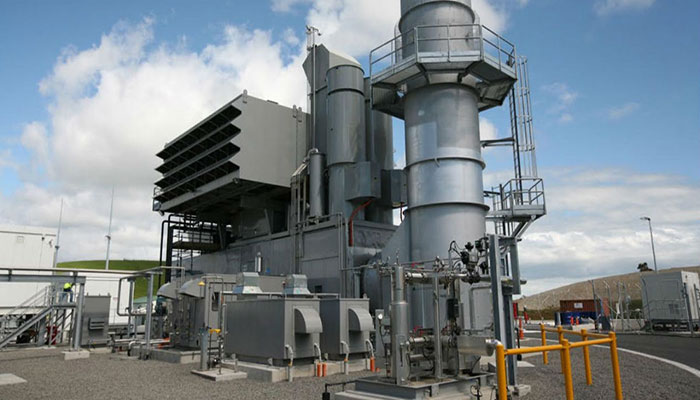Private sector demands uniform RLNG transportation tariff
ISLAMABAD: Private sector on Thursday urged the government to treat it on a par with public companies when it comes to tariffs for transporting regasified liquefied natural gas (RLNG).
Representatives of textile, compressed natural gas (CNG) and fertiliser sectors maintained this viewpoint during Oil and Gas Regulatory Authority’s (Ogra) public hearing on determination of transportation and distribution tariff for shippers FY2021.
Ogra was pleaded to direct Sui Northern Gas Pipelines Limited (SNGPL) to charge equitable transportation tariffs from public and private sectors.
SNGPL asked for times-high tariff from the Ogra for private sector against what it charges from the public companies, including Pakistan LNG Limited.
The private sector’s interveners included JS Global, All Pakistan Textile Mills Association (Aptma), and All Pakistan CNG Association.
They argued that if the shippers were allowed to charge higher transportation tariff from the private sector compared to public sector, then it would be discrimination and also discourage the private LNG import.
A SNGPL official feared that if Ogra gives decision of charging uniformed tariff, then consumers could shift to the third parties. SNGPL has been operating on ring-fenced regime based on supply of indigenous and imported gas.
Arsalan Ahmed, an official of JS Global said the current mechanism of transportation proposed by gas the utility would make it difficult for the private sector to import gas.
“If there is difference in transportation tariff, then government should have to give subsidy. Of course, the industry should be auditable,” Ahmed said.
Saqib Aziz, a representative of Fatima Fertilizers questioned the SNGPL’s demand for high tariff.
“There should be a level-playing field for the private and public sectors. There should be no discrimination. Market should be open for private sector,” Aziz said.
Ghayas Paracha, CEO of United Gas Distribution Company said the company has been doing efforts to import LNG for the last four years, but various hurdles were created.
“This is discouraging the local businesses and foreign companies that want to invest in the country,” said Paracha.”Tariff should be same for both private and public sector’s importers.”
Paracha sad gas distribution companies are asking for huge insurance fee from third party importers.
“Ogra should remove the head of legal professional charges claimed by the SNGPL,” he said. “We have never seen such thing in the world where the companies are operating in LNG and gas business.”
Shahid Sattar, who was representing Aptma asked the regulator for final decision and not provisional.
“Temporary decision will make it difficult for the LNG importer to recover dues form consumers,” said Sattar. “Textile sector is interested in LNG import as its demand is around 350 million metric cubic feet per day. If the full and final decision is not issued, it will be difficult for textile businesses to recover dues on products after they are exported. We want that private sector must be facilitated in LNG import.” The government has already notified a framework for the import of LNG by private parties and sanctioned excess capacity available at LNG terminals to private importers.
Currently, two state-owned companies, Pakistan State Oil and Pakistan and Pakistan LNG Terminals Limited, are engaged in LNG imports.
December and January see a sharp spike in demand for gas, while this year the demand-supply gap will be greater on the back of higher consumption and diminishing indigenous supply.
SNGPL that feeds Punjab, Khyber Pakhtunkhwa and Kashmir would face 300-350 mmcfd in peak winter season. The government also expects 250-400 mmcfd of gas shortfall in the Sui Southern Gas Company system in the coming winters.
-
 Hilary Duff’s Son Roasts Her Outfit In New Album Interview
Hilary Duff’s Son Roasts Her Outfit In New Album Interview -
 Alexandra Daddario, Andrew Form Part Ways After 3 Years Of Marriage
Alexandra Daddario, Andrew Form Part Ways After 3 Years Of Marriage -
 Eric Dane Rejected Sex Symbol Label
Eric Dane Rejected Sex Symbol Label -
 Avan Jogia Says Life With Fiancee Halsey Feels Like 'coming Home'
Avan Jogia Says Life With Fiancee Halsey Feels Like 'coming Home' -
 Kate Middleton's Role In Handling Prince William And Harry Feud Revealed
Kate Middleton's Role In Handling Prince William And Harry Feud Revealed -
 Tucker Carlson Says Passport Seized, Staff Member Questioned At Israel Airport
Tucker Carlson Says Passport Seized, Staff Member Questioned At Israel Airport -
 David, Victoria Beckham Gushes Over 'fiercely Loyal' Son Cruz On Special Day
David, Victoria Beckham Gushes Over 'fiercely Loyal' Son Cruz On Special Day -
 Taylor Swift Made Sure Jodie Turner-Smith's Little Girl Had A Special Day On 'Opalite' Music Video Set
Taylor Swift Made Sure Jodie Turner-Smith's Little Girl Had A Special Day On 'Opalite' Music Video Set -
 Eric Dane Says Touching Goodbye To Daughters Billie And Georgia In New Netflix Documentary
Eric Dane Says Touching Goodbye To Daughters Billie And Georgia In New Netflix Documentary -
 Channing Tatum Reveals What He Told Daughter After Violent Incident At School
Channing Tatum Reveals What He Told Daughter After Violent Incident At School -
 King Charles Lands In The Line Of Fire Because Of Andrew Mountbatten-Windsor
King Charles Lands In The Line Of Fire Because Of Andrew Mountbatten-Windsor -
 Denise Richards Doubles Down On Abuse Claims Against Ex Husband Aaron Phypers Amid Show Return
Denise Richards Doubles Down On Abuse Claims Against Ex Husband Aaron Phypers Amid Show Return -
 Russia Set To Block Overseas Crypto Exchanges In Sweeping Crackdown
Russia Set To Block Overseas Crypto Exchanges In Sweeping Crackdown -
 Gwyneth Paltrow Reveals Deep Personal Connection With Kate Hudson
Gwyneth Paltrow Reveals Deep Personal Connection With Kate Hudson -
 Prince Harry, Meghan Markle’s Game Plan For Beatrice, Eugenie: ‘Extra Popcorn For This Disaster’
Prince Harry, Meghan Markle’s Game Plan For Beatrice, Eugenie: ‘Extra Popcorn For This Disaster’ -
 OpenAI To Rollout AI Powered Smart Speakers By 2027
OpenAI To Rollout AI Powered Smart Speakers By 2027




